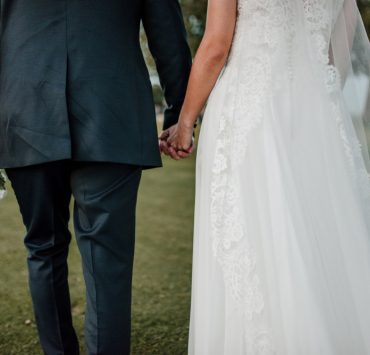Have you heard of the term “pamanhikan” but you don’t know what it means? Perhaps you’re already familiar with the term, and you’re not sure what happens in a pamanhikan?
If you’re getting married in the Philippines, there’s a huge chance you’ve already heard of the different Pinoy wedding traditions being practiced. One of these is the pamanhikan or pamamanhikan, which happens several months or weeks before the wedding. During this tradition, the future groom meets the future bride’s family to formally ask for her hand in marriage and receive the blessing of her parents.
Understandably, some couples might feel a little nervous about arranging a pamanhikan. After all, it’s a significant event that’s expected of marrying couples in the Philippines, even today.
If you want to prepare for a pamanhikan, below are some tips to keep in mind and some suggestions for arranging one.

What happens during pamanhikan?
The word “pamanhikan” comes from the Filipino root word panhik which means “to take upstairs” or “to climb.” This was applicable back when traditional Filipino houses were elevated, and entrances were accessed through a flight of stairs. Future grooms would have to climb them first to get inside the house and meet the future bride’s parents.
For those who are not familiar with the term, pamanhikan is not a ritual, but more of a social gathering as a way of honoring and showing respect for the parents of the bride. As one of the first steps in a Filipino wedding, a pamanhikan generally works by having the future groom’s family visit the family of the future bride. The couple then introduces their family members to each other and the groom speaks with the bride’s parents to let them know of his intentions of marriage.
The pamanhikan can also serve as a chance for the couple to begin discussing their marriage plans. This includes details for the wedding itself, and even details for life after the wedding (such as their schedule for moving into a new home, or raising children). The parents from both sides might also take this opportunity to give advice to the couple as they begin their own marriage journey.

Is pamanhikan required?
The pamanhikan is not a wedding requirement in Filipino weddings, and does not replace the actual engagement proposal. Because the decision to get married is up to you, as the couple, you might opt to not have a pamanhikan at all.
However, you can still choose to practice this Filipino wedding custom, which is popular even in the modern era. Given how Filipino culture is anchored on family-orientedness, the pamanhikan continues to be a highly valued Filipino wedding practice as it demonstrates respect and symbolizes the couple’s intention to be married to each other.
Guide for Arranging a Pamanhikan
Now that you have an idea about what happens in a pamanhikan, let’s get you prepared with some tips to remember before and during the event!
Tips Before Pamanhikan

-
Invite the right people
There are no hard rules on who should be invited to a pamanhikan. Aside from the parents of the couple, it can even include extended family members or close friends. Just remember to prioritize the parents or legal guardians of the future bride and groom! Don’t forget to confirm their attendance right before the pamanhikan as well, to ensure that everyone will be present.
-
Pick the most convenient location and schedule
Although it is customary to hold the pamanhikan at the future bride’s home, couples today might choose to hold it outside, such as a restaurant or hotel. This lessens the preparations needed from the hosting family, and is helpful especially if the bride’s home is too small to accommodate a lot of guests. If your preferred location is in a public place, it’s better to get a private room. This provides a quieter setting for the families to discuss personal matters.
Some family members might also need to travel from different provinces to attend the pamanhikan. Discuss with the attendees beforehand if you will sponsor their transportation, which can include their plane tickets and toll expenses for the car rides. Clarify as well if you will be able to provide accommodations for those coming from faraway places.
Also consider the most convenient meal time for all attendees. This is because it is customary for the pamanhikan to take place at dinner. Since the pamanhikan can last up to around three hours, more or less, it’s better to ensure that the attendees have time for the event as well.

-
Discuss the pamanhikan food
If you choose the future bride’s home as the venue, then as the host, the bride’s family traditionally prepares food during pamanhikan. However, these days, the groom’s family might want to bring food to share.
It is customary for both families to serve native food from their province. Both families can also decide to cook a dish using their special family recipe. No matter what you decide to have in your pamanhikan menu, just remember to consider the dietary requirements of all attendees. Perhaps a family member is not allowed to have a certain type of food due to health reasons, or maybe others can only eat certain foods as a lifestyle choice, such as vegetarians.
-
Consider bringing gifts
There are no hard rules about bringing gifts to a pamanhikan, although this does happen in practice. It’s customary for the groom’s family to bring a pasalubong, or a gift as a token of appreciation to the family of the bride. Some ideas to bring as gifts to the pamanhikan include flowers and food that can be consumed later on, such as desserts or wine.
If you want to bring a gift that can be used for the wedding itself, remember the tradition “something old, something new, something borrowed, and something blue?” By following this, families of the future groom can already have a lot of options to choose from as a gift!

-
Prepare with as much details as you can
Because the pamanhikan is often used as the time to begin discussing marriage plans, it’s better to talk beforehand as a couple, so that you both know what you’ll be presenting to your parents. To confidently answer your parents’ questions, prepare to be asked about wedding details such as the venue, guest list, and theme.
The date is also very important, since your parents might believe in the sukob wedding superstition and might discourage you from getting married during a certain period of time.
Be prepared to be asked on some sensitive topics as well, such as your plans for funding the wedding and having children. Your parents might also ask about your new living arrangements after the wedding. It’s important to decide as a couple which topics to bring up at the pamanhikan, and which ones to discuss privately. There’s also nothing wrong with telling your family that some details are still for discussion or that you need their help in planning the wedding of your dreams.
On a more serious note, it’s also possible that family members will raise some concerns about your union during the pamanhikan.
Take the time to gather sentiments from each family, and iron out these concerns beforehand, so that the pamanhikan goes smoothly. This is also a chance for you to give tips to your own family members on how to bond with your partner’s family! You can note which family members have the same hobbies and interests, so that you’ll know how to introduce them during the actual pamanhikan.
Tips During Pamanhikan

-
Be respectful
Respect is at the heart of the pamanhikan tradition, so it’s important to put this in practice at all times. Remember that this includes dressing up according to the location of the pamanhikan.
Sometimes, the pamanhikan can be the first time that the couple’s families will meet each other!
If this is the case, then another highlight of this event would be the families getting to know each other better. Ensure that everyone is introduced to each other properly.
When it comes to greeting elders, the traditional Filipino way of being polite is to practice the mano by taking the elder’s hand and placing it upon your forehead. Take note that some people might not want to practice the mano, and instead will tell you that they prefer a kiss on the cheek (beso) or a hug.
-
Ask for the blessing of the bride’s parents
This is the moment you’ve been preparing for! As the future groom, it’s up to you to step up and take the initiative to formally ask your future bride’s hand in marriage. Everyone in the room may be present, but it’s important for you to directly address the bride’s parents or legal guardians.
Be clear and declare your intentions for their daughter, and describe your possible future family together. Above all, show your sincerity while remaining respectful, and always speak from the heart.

-
Set expectations for the wedding
During the pamanhikan, you can also bring up the kind of wedding that you want. Will it be a small wedding? Will you have one wedding just with family and another one with more guests? Feel free to imagine the perfect wedding and the preparations needed!
The wedding budget can be a delicate topic, so it’s up to you if you want to bring this up. Traditionally, the groom’s family shoulders the wedding expenses, but couples today might opt to split all wedding expenses between themselves.
It’s best to be prepared in case the question on finances comes up. This also is a chance for you to be heard in case you need monetary assistance, but don’t come into the pamanhikan with the expectation that your families will make a financial offer. Perhaps someone in the family can just offer financial advice, or maybe another family member might know wedding providers that offer good deals.
-
Listen for marriage tips and advice
Finally, use the pamanhikan as a chance to ask your parents for helpful tips that keep a marriage healthy, harmonious, and lasting. Your parents will most likely speak from experience and will likely provide valuable advice that can help you learn something new about your partner.
Once you take their advice to heart, you learn about your partner’s family values and their way of life. After all, soon you will become a part of their family as well!
It’s also possible that your parents will raise their concerns during the pamanhikan and not approve of the engagement. When this happens, use this time to discuss the problems that worry them and find a way to address these. Acknowledge their perspective, try to understand where they’re coming from, and present your solutions in a respectful manner.

What Happens After Pamanhikan?
Since you and your partner have already started on some wedding planning, it’ll be an incredibly exciting time as you head towards the next step! You can feel free to begin full preparations for your wedding, knowing you’ve fulfilled traditional obligations to your partner’s family by practicing the beautiful customs of pamanhikan.
Because you’ve formally introduced both families during the pamanhikan, they can now start bonding! There’s still some time left before the actual wedding, so you can bring your two families even closer by letting them work together on wedding preparations, such as the despedida de soltera.
The two families can enjoy more by the time the wedding comes around, given that they already had a lot of time to be at ease together. This is just another benefit that the pamanhikan provides a couple looking to get married!
If you want a wedding theme that continues to honor Filipino traditions on your big day, check out our tips for a Filipiniana wedding theme, or continue browsing our site to learn more about other Filipino wedding traditions.
Author: Anjenica Durana
Anjenica's biggest dream in life is to go on a great adventure. While still waiting for a tall wizard to knock at her door, or for a fairy to fly through her window, or for her grandmother to reveal their royal lineage (any time now), she works undercover as a writer who pretends to enjoy playing badminton.




